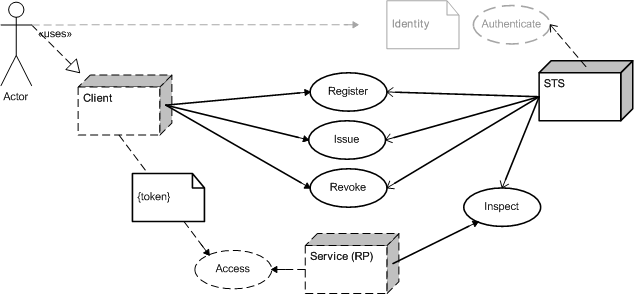A Security Token Service (STS) is originally described in the WS-Trust and WS-Federation protocols to build, sign, and issue security tokens. Under WS-Trust a token issuing authority uses a STS to
WS-Trust and dependent standards are rich and nuanced specifications that support SOAP-based web services. This application implements specifications developed within the IETF OAuth working group that provides (most) WS-Trust capabilities and features via REST + JSON protocols (as opposed to SOAP + XML).
 Generic security token service actor model. Dotted items are external
Generic security token service actor model. Dotted items are external
The security token service provides standardized methods to
Note that establishing actor identity and accessing relying party services are outside the scope of the STS.
Use cases
The security token service identifies an actor by issuing electronic tokens that an actor may use to identify himself when accessing a service. Tokens issued by the STS assert the actor's identity, and a relying party may (or may not) trust the STS assertion.
In its simplest form the token is merely a convenient substitute for a username plus password. In more complex configurations, the STS enables delegation of authority, trusted identity management, and federated authentication plus authorization. In more typical configuration an actor configures a client to access a service on the actor's behalf. This process is called delegation.
STS concepts and background
A STS is capable of validating security tokens provided to it and issuing new security tokens in response, which enables clients to obtain appropriate access credentials for resources in heterogeneous environments or across security domains.
Web Service clients have used WS-Trust
as the protocol to interact with an STS for token exchange.
WS-Trust uses XML and SOAP, while the trend in modern Web development has
been towards RESTful (Representational State Transfer) patterns and
JSON.
Many (but not all) of the WS-Trust features are replicated in the
OAuth 2.0 Token Exchange
specification, which enables security token exchange
in a secure and standardized manner using REST + JSON.